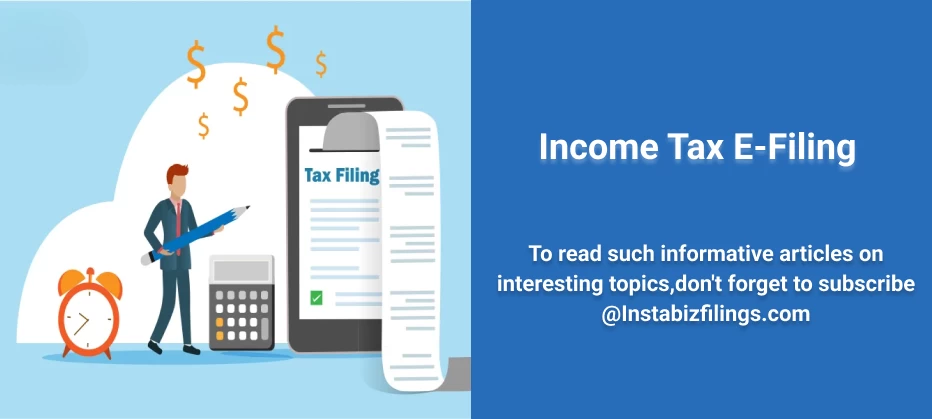
Income Tax E-Filing
September 16, 2025 by Team Instabizfilings
Introduction
Filing income tax returns is not just a legal obligation for eligible taxpayers in India but also an essential part of responsible financial planning. With the introduction of e-filing (electronic filing), the process has become faster, simpler, and more transparent.
In this article, we will explain everything you need to know about Income Tax E-Filing what it is, who should file, how to file, benefits, documents required, and common mistakes to avoid.
What is Income Tax E-Filing?
E-Filing is also a procedure of reporting your Income Tax Return (ITR) via the Internet on the portal of the Income Tax Department of India.
It substitutes the old manual system of walking in with paper returns and gives people, practitioners and companies a chance to file tax returns at any time or place.
Who Should File Income Tax Returns (ITR)?
Filing ITR is mandatory if you fall under any of the following categories:
Individuals:
-
Annual gross income exceeds:
- ₹2.5 lakh (below 60 years)
- ₹3 lakh (60-80 years)
- ₹5 lakh (above 80 years)
-
Earn income from more than one source (salary + freelance, etc.)
-
Want to claim a tax refund
-
Have foreign assets or income
-
Need to carry forward a loss (like capital loss)
-
Have deposited ₹1 crore or more in a bank account
-
Incurred expenses on foreign travel or electricity exceeding ₹2 lakh / ₹1 lakh, respectively
-
Are you applying for a loan or a visa
Companies & Businesses:
-
All registered companies and LLPs must file ITR regardless of income or loss.
-
Businesses and professionals with income over ₹2.5 lakh (after deductions).
Types of ITR Forms
Here are some commonly used ITR forms:
|
Form |
Applicable For |
|
ITR-1 (Sahaj) |
Salaried individuals with income up to ₹50 lakh |
|
Individuals/HUFs with capital gains, foreign income |
|
|
Professionals or business income |
|
|
ITR-4 (Sugam) |
Presumptive income scheme (under Section 44AD, 44ADA) |
|
Partnership Firms, LLPs, Companies, Trusts |
Documents Required for E-Filing
Here’s what you’ll need before you begin:
-
Form 16 (provided by employer)
-
Form 26AS (tax credit statement)
-
Annual Information Statement (AIS)
-
Bank account details
-
Details of investments, deductions (80C, 80D, etc.)
-
Capital gains statements
-
Interest certificates from banks/post offices
-
Rental income details
-
Foreign income/assets (if any)
Step-by-Step Guide to File Income Tax Return Online
- Step 1: Register/Login
-
Register or log in using your PAN as user ID
- Step 2: Select “File Income Tax Return”
-
Choose the assessment year
-
Select online or offline mode
- Step 3: Choose Status & ITR Form
-
Individual / HUF / Others
-
Choose the appropriate ITR form
- Step 4: Fill in Details
-
Personal information
-
Income details (salary, interest, capital gains)
-
Deductions under 80C, 80D, etc.
-
Tax payments / TDS
- Step 5: Validate and Submit
-
Verify all details
-
Submit return
- Step 6: E-Verification
- E-Verify using:
-
- Aadhaar OTP
-
-
Net banking
-
Bank account EVC
-
- OR send a signed physical ITR-V to CPC, Bengaluru
Benefits of E-Filing Income Tax Return
-
Quick and easy process
-
Faster refund processing
-
Helps you track your financials
-
Required for loan, visa, and tender applications
-
Avoids penalties and legal complications
-
Can help you carry forward losses
-
Proof of income and tax compliance
Due Dates for E-Filing
|
Category |
Due Date (FY 2024-25) |
|
Individuals / Salaried |
31st July 2025 |
|
Audit Cases (Business/Profession) |
31st October 2025 |
|
Companies / Firms |
31st October 2025 |
|
Belated or Revised Returns |
31st December 2025 |
Note: Filing after the due date may attract a late fee under Section 234F.
Penalties for Late Filing
|
Income Level |
Penalty |
|
Up to ₹5 lakh |
₹1,000 |
|
Above ₹5 lakh |
₹5,000 |
Also, interest under Sections 234A, 234B, and 234C may be charged.
Common Mistakes to Avoid
-
Using the wrong ITR form
-
Not reporting all income sources (e.g. FD interest)
-
Errors in bank or PAN details
-
Missing deductions and exemptions
-
Not verifying ITR after filing
-
Late filing
Conclusion
Income Tax e-filing has simplified tax compliance in India. With the right preparation and documents, the process can be completed in under an hour. Whether you're a salaried employee, freelancer, or business owner, filing your ITR on time not only helps avoid penalties but also builds your financial credibility.
If you're unsure about your filing status or have complex income sources, it’s wise to consult a Chartered Accountant (CA) or a certified tax advisor.
Disclaimer
The information provided in this blog is purely for general informational purposes only. While every effort has been made to ensure the accuracy, reliability and completeness of the content presented, we make no representations or warranties of any kind, express or implied, for the same.
We expressly disclaim any and all liability for any loss, damage or injury arising from or in connection with the use of or reliance on this information. This includes, but is not limited to, any direct, indirect, incidental, consequential or punitive damage.
Further, we reserve the right to make changes to the content at any time without prior notice. For specific advice tailored to your situation, we request you to get in touch with us.

Need more details? We can help! Talk to our experts now!
Start Your Business Registration – Talk to Our Experts Now!

Still Confused?
Talk to experts? Fill in the information and we will reach out in 24 Working Hours.

